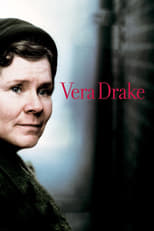CinemaSerf
Mar 28, 2023
7/10
Imelda Staunton is great here as the middle-aged wife, merrily living her family life with husband "Stan" (Phil Davis) and her two grown up children and their partners. She is well respected by her peers and seems to be the epitome of the hardworking 1950s British housewife. Until, that is - a policeman arrives at her door and her world starts to cave in. Now we know from fairly early on that "Vera" likes to help girls out. To be fair - there are plenty of them who are eligible. Raising a family when rationing was still around, jobs thin on the ground and their men folks usually keen to run a mile (if they even knew/or cared) was a daunting prospect to many a young woman, bereft of familial or state support. She didn't take cash for her carbolic and syringe services, she just thinks she is doing the best for all concerned. Needless to say the morals of the time did not necessarily concur, the law certainly didn't - and so we are faced with a rather well presented and written analysis of the antiquated and illiberal situation in which many women found themselves. The film doesn't attempt to moralise - it allows each of us to observe her activities and to evaluate - almost on a case by case basis - the relative merits of her interventions and I think that is particularly effective when stimulating the debate that this film is bound to create. The supporting cast including a career defining contribution from Daniel Mays as her conflicted son "Sid", Eddie Marsan and Heather Craney allow the story to spread out covering not just the actions of "Vera" but also of the complicity - sympathetically and/or venally motivated - by those in the medical profession and those in the community who had less scruples in monetising the misfortune of others. Above all, this is thought provoking - there is no simple answer to what's going on here, and for that Staunton (and Mike Leigh) are to be commended. It's not for the fainted-hearted, but the most poignant of films never are.
